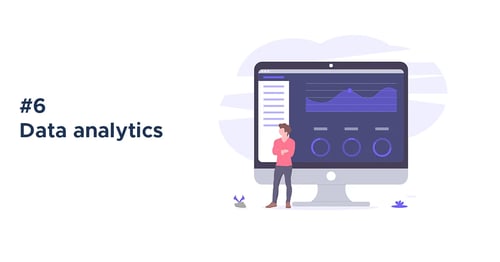Legal Technology in Law Firms: 3 Ways To Make Your Life Easier

Lawyers have traditionally been reluctant to adopt new and innovative technology. However, the latter is rapidly changing. This is now driven by the growing ecosystem of legal technology (lawtech) vendors seeking to disrupt and reinvent the industry.
In 2018, the investment in legal technology has reached a record-setting $1 billion.
Technology is no longer optional in the legal world. Any law firm can achieve incredible results from embracing the legal innovation and use to fuel their digital transformation.
Use legal technology to automate the routine. The repetitive. The simple. How do you determine what these tasks are? Look to your processes. Look at each step. The time is now to cut through the bs around legal tech and AI. #LegalTech #lawyers #innovation
— Colin S. Levy (@Clevy_Law) May 23, 2019
There are three key types of legal technology:
- Technology to support day to day practice management (i.e. to increase billings and improve case management efficiency)
- Technology to handle complex legal matters
- Technology to enable agile working
Let’s deal with each in turn!
Technology to support day to day practice management
Legal technology can completely transform how Solicitors work on cases on a daily basis, saving time and costs, increasing the speed of delivery, boosting quality, improving client communication, and enhancing billable hours.
Let’s see how!
New age of the Case Management Software
.webp?width=500&height=263&name=1%20(1).webp)
Case management technology certainly is not new, but there have been huge advances in this field in recent years, including cloud-based solutions, automation and bespoke workflow.
Being cloud-based means that practices no longer require in-house IT expertise for:
- Installation
- Maintenance
- Upgrading
- Security management
And these solutions are extremely secure due to their use of encryption and can be accessed from any location.
Best legal case management software solutions:
The latest breed of legal case management software, from vendors such as Clio, Hoowla, and LawWare, brings together all law firm needs under a single platform.
Many will not only capture the details and latest status of a case, but they also include:
- Legal time recording
- Smart document management
- Task management
- Marketing and management reporting
- Dashboards, and;
- Tailored workflow;
Many law firms are choosing to move away from the integration of separate technologies, all of which serve individual needs. Technical integration of this type demands IT expertise and can be unreliable;
By contrast, modern case management solutions bring all of these aspects together under a single platform, in a manner which is easy to use and simple to implement.
Greater opportunities for management and control
From a senior management perspective, case management solutions enable partners to see the status of the whole practice or a practice area in a single view.
Tailored ‘Dashboards’ can be created to show, for example, displaying:
- Expected billing hours for the month
- Volume of outstanding tasks
- Type of work being undertaken
- Unpaid accounts
- Productivity of chargeable individuals
As such, dashboards allow problems to be quickly identified and remedies sought.
Tailored workflow means that for every type of legal service, it is possible to define a series of tasks to be completed, who needs to complete these and/or approve them, the timescales for each, templates to be used, and the minimum documents required.

One law firm which fully embraced digital technology from its inception is London-based RVS Solicitors.
When we asked why they have invested so heavily in lawtech, Dr Lusine Navasardyan, Director at RVS stated:
"When we envisioned what our law practice was going to be like, we had two big issues we wanted to address: making high-quality legal services more available to larger public and ensuring excellent work-life balance for our staff.
So, we set-up the firm to be completely paperless. This ensures that we do not waste funds on office or storage space that does not benefit the clients in any way. This also ensures our lawyers are flexible and that we can work from anywhere in the world. This also extends our client base, as we do not need to be geographically in the same space as our clients to cater to their needs.”
Document automation and contract management
.webp?width=500&height=263&name=2%20(1).webp)
Digital document management and automation software, such as the solution from Bigle Legal, is now in high demand within modern law firms.
Document automation solutions enable the rapid creation of legally water-tight and bespoke legal documents, contracts or agreements of any type.
Each document/contract is created by asking the user to complete a series of questions; the document is then automatically generated based on the information provided and is updated according to any changes in the law.
These solutions also enable:
- Version management of template documents
- Centralised cloud digital document storage
- Tailorable workflow with approval and digital signatures functionality
- Archiving and retention policies ensure no items are stored beyond the organisation's retention policy.
- High levels of security, therefore the risk of a data breach is mitigated
- GDPR and data protection compliance
- Collaborative instruments for the entire team
Document automation has also been adopted by RVS Solicitors to great effect; as Lusine explained to us:
“We use the latest technologies to cut down the work the menial work, every aspect that can be automated by using modern technologies, is automated: from client information intake up to creating some legal documents for clients is possible to automate, thus saving funds, having higher turnaround for work and being more flexible.
This, in turn, means trust and appreciation from clients, allowing us to grow at a faster pace than any of the traditional firms."
Rethinking accounting & billing
.webp?width=500&height=263&name=3%20(1).webp)
By embracing the latest breed of accounting and billing technology, your firm can make decisions which are reflective of your live financial position situation, and not outdated financial reporting.
Besides, compliance with accounting and taxation requirements is assured, and time is freed up by eliminating previously manual accounting tasks.
Some billing solutions will even link to your company phone systems to automatically log the time spent on calls for a given case/client. In addition, as many Solicitors work remotely, time management solutions enable the easy capture of billable time on mobile devices.
Best billing & accounting tools for lawyers:
- Xero (which will integrate with practice management systems),
- OneAdvanced legal accounting
- Quill
- Insight Legal
Improving customer communication
Corporate clients and individuals now demand more from the law firms they entrust with their matters. Whereas traditionally, all communication between client was in face to face meetings and via phone, our customers now expect to be able to login to a secure portal to see the latest status of their legal matter.
Additionally, many expect the law firms to provide documents needed by their Solicitor easily and securely, and to have the option to hold meetings using video conferencing.
Modern case management solutions already integrate these features, allowing clients to receive automated updates, to view the latest status of their case from a mobile device and raise any questions, at a time that suits them.
Other technologies transforming the daily practice of law

There are also emerging technologies which are expected to bring considerable benefits to the way in which law offices undertake daily tasks, including:
- Smart-contracts (using block-chain technology)
- Digital signatures (end-to-end document management solutions like Bigle Legal also incorporate e-signing)
- Self-service technology
- Artificial Intelligence (AI) – e.g. for quick contract analysis and legal research
Such solutions provide further gains in speed, security and convenience for clients, reducing the costs for law firms.
Technology to handle complex legal matters
Technology is very much an ‘enabler’; it enables law firms to take on and succeed in more complex work than could previously have been considered.Under this category of technology, we see considerable gains in the areas of eDiscovery and data analytics:
Reducing complexity with eDiscovery

Electronic discovery, also referred to as eDiscovery (or eDisclosure) is enabling even the most complex legal matters to be taken on by Solicitors.
It allows for the proliferation of digital information, across a wide range of device types, including:
- Mobile phones
- Laptops
- Tablets
- Dashcams
- Computers
- USB drives
- and even drones
This means evidence, which may be essential to winning a legal case, can be extremely difficult to find.
Taking on such cases can be financially unfeasible, perhaps taking weeks or months for lawyers to sort and make sense of the available information. eDiscovery is now making this process incredibly quick and accurate, enabling deeply complex cases to be taken on and won.
Best eDiscovery tools:
Getting strategic with legal data analytics

Many will have heard of the rise of ‘big data’ and how this can transform decision making and provide unique insights.
Litigation forecasting solutions look across vast amounts of historical data to determine the chances of winning a specific case. By looking at every decision made by a particular judge or by type of case, a strategy can be created, which will increase the chance of success.
We expect the range and scope of possibilities in this area to grow considerably. The sooner Solicitors can embrace data analytics, the faster they can leverage its considerable benefits.
Best legal data analytics tools:
Technology to enable agile working

Agile working extends beyond the home-working model, meaning that employers should have more autonomy around where and when they work.
According to an article in the Financial Times, agile working is strongly on the rise:
“The natural conclusion is that requests for agile working are bound to rise. Employers should start working on practical solutions, sooner rather than later. Many, including blue-chip companies, are simply not moving fast enough.”
While agile provides considerable benefits to staff members, it poses risks and challenges that office-based working naturally mitigates.
Thankfully, thanks to the latest legal technology, your valued legal experts can have the flexibility they are increasingly seeking, without compromising your organisation’s security and privacy.
To illustrate:
- Cloud-based solutions mean that case information can be accessed on any device with complete security (and the case file is not stored locally on the device).
- It is no longer needed to take paper files from the office in order to be able to work in another location.
- Device management software and multi-factor authenticating (i.e. using bio-metrics) means that laptops, mobile phones, and tablets can be ‘locked down’ and made entirely secure – rendering them useless in the hands of any other person.
How to implement technology within your organisation
Technology has the power to transform law practice. However, many may still be concerned about the costs, demand on resources, risk of cyber-security breaches, and possible downtime of digital technology in law firms.
While each of these are valid concerns, these are now easily overcome with the latest law technology.
All investment in legal technology requires four main ingredients to be successful:
1. Analyzing educational materials and spreading knowledge across all company’s departments and all employees
Your ability to prepare the entire company for the change is essential for successful digital transformation.
2. Ensuring full engagement and buy-in from internal managers and partners
Poor buy-in from senior staff can damage the chance of success of any project even before it commences. Due to the natural resistance to change within any business, it is this buy-in and enthusiasm from the top, which makes sure staff persist and ultimately make the solution work.
3. Finding a solution that meets your needs
Finding a solution that reflects your business goals and your company’s specifics is key.
We recommend you take your time at this stage. Sit down to document your business needs and objectives and seek solutions which meet your short and long-term needs.
4. Implementing a new solution effectively and ensuring it realizes the intended benefits
Once you have decided on your chosen solution, it is vital to seek ‘system champions’ from within your business who will play a key and influential role in its successful implementation and subsequent bedding in.
Employing a dedicated project manager with experience of law practices and IT solution implementation will ensure the project is managed from the perspectives of risk, cost, people, and time.
Ready to embrace legal technology?

Lawtech offers a great opportunity for the law industry to reinvent and evolve, as is apparent in every other sector, including medicine and science. While some aspects of legal technology are mature and well established, a great deal is yet to come.
But before implementing any technology within your law firm, it is vital you carry out the necessary due diligence.
Take the time to truly understand the needs of your users and cast your net far and wide to find the right vendors and solutions. These efforts will save you vast quantities of time and money at a later date.
While these new disruptive technologies develop, the latest iteration of legal technology should be wholeheartedly embraced. As a digital firm, you will see great gains in quality, consistency, client service, speed, time-saving, cost and risk reduction in your daily operations.
 By
By




